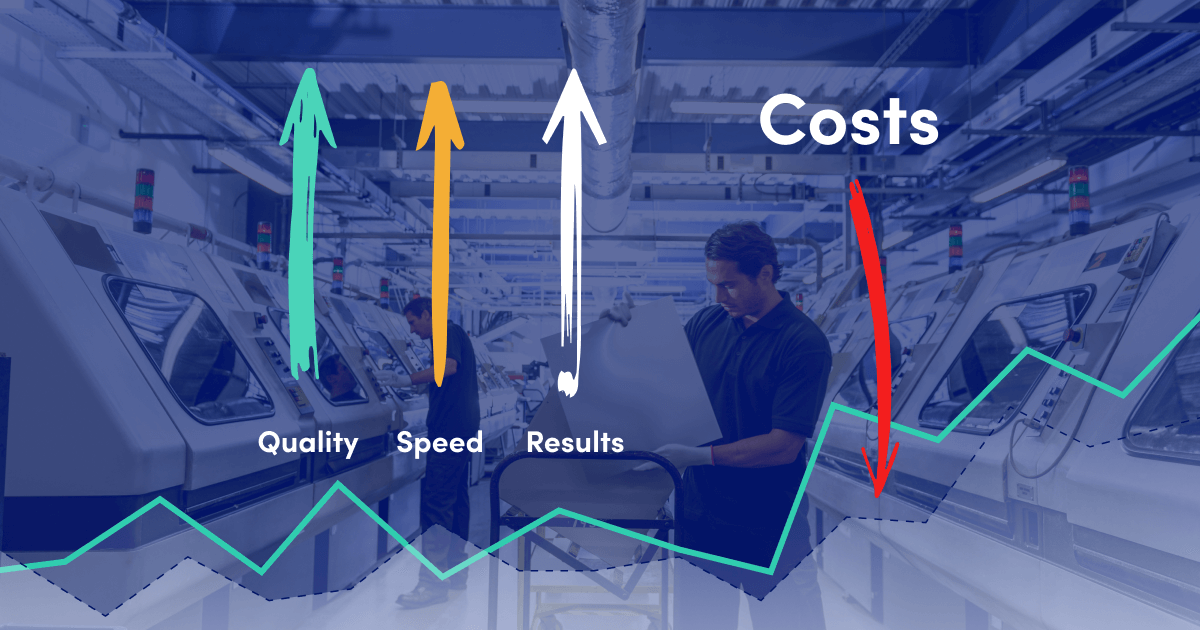When we talk about cloud computing, we refer to the practice of using remote servers to store, manage and process data. When, on the other hand, we think about what cloud manufacturing platforms are, we must consider the same principles of exchange and remote access to information but extended to the world of industry.
The aim is to enable a model that allows production capacity and resources to be shared on cloud manufacturing platforms. Cloud manufacturing, for which the acronym CMfg is often used, allows manufacturers to adopt a manufacturing as a service (MaaS) model. In this model, process digitization technologies such as collaborative manufacturing, virtual manufacturing, the Internet of Things (IoT) and, of course, the cloud play a central role.
What is cloud manufacturing?
In general, cloud manufacturing is presented with a four-tier structure. Let’s start from the levels – first there is the application level, then we move on to virtualized services, global services, and actual production resources. Virtual production lines are a true extension of classic production lines.
Benefits of cloud manufacturing
The fourth industrial revolution – in which digitalization is the protagonist – was evident throughout the early 2020s. However, each business is at a different stage and it will still be several years before it scales to the entire industry. However, it is clear that those that are already immersed in the digital transformation journey have made significant progress in terms of productivity, agility, sustainability, speed to market... and the list goes on.
Lower cost

This is the main benefit, since it has many other secondary benefits, as you will see in the following points. When working in the cloud, the investment and cost of IT infrastructure, both hardware and software, is substantially reduced. In addition to the technology itself, there are savings in resources associated with installation, maintenance, technical staff, energy, etc. Cloud servers and licenses are in subscription models where you pay only for what you use.
Flexibility
Probably the main non-pecuniary feature of cloud manufacturing is flexibility. Parts manufacturing, for example, can be outsourced to the nearest manufacturer. This means that supply chains are also highly flexible, which minimizes dependence on a single circle of suppliers. This also results in reduced costs and environmental impact, thanks to shorter distances.
Quality

The second aspect is quality. The ability to choose the manufacturer means entrusting the creation of the product to a trusted supplier. And if cloud manufacturing platforms perform due diligence on suppliers and partners, verifying and testing their capabilities, the customer will be reasonably certain of the quality of the final product.
Data availability
The third aspect is the availability of shared information. Anyone involved in the project has full visibility, at all stages of the project. In the design stages, thanks to the cloud manufacturing platforms’ automatisms, the entire process is simplified, avoiding, for example, the issuing of quotations for parts that are difficult or impossible to produce without careful verification by those in charge.
Reduced delivery times
This model is efficient because it also helps to reduce product delivery times by distributing the work among two or more suppliers and producers. This is especially useful in the event that the main assignee of the order is unable to fulfill the request within the established timeframe.
Automatic updates
Thanks to cloud manufacturing, the equipment is always up-to-date and the risk of obsolescence is reduced, both in the servers hosted outside the company's facilities and in the software itself, which always operates with the latest version. This translates into greater security against cyber-attacks and a reduction of possible breaches or vulnerabilities that may occur.
Mobility
The mobility of cloud manufacturing allows you, regardless of the device you use or the place where you are, to remotely access information and work with it whenever you want. This eliminates the need to be in a physical space and facilitates the possibility of teleworking with guarantees by simply needing an Internet connection.
In addition, this extends to the entire network of employees, suppliers or customers, with whom you can share workflows to collaborate in the cloud in real time. This simplifies, streamlines and makes production more efficient, helping to reduce product delivery times and giving total visibility of all phases of a project to anyone involved in it.
Security and encryption

Continuing with the theme of cybersecurity, in cloud manufacturing data is stored encrypted and is backed up by automatic and regular backups. In addition, there are methods to control and monitor access to information.
Collaboration
Finally, cloud manufacturing platforms that bring together manufacturers with different skills and machinery allow companies to access all the necessary resources. In fact, it is dispersed manufacturing that avoids having to make investments directly. Something that in the industrialized world can mean huge expenses.
Various sizes of organizations using cloud manufacturing
For years, most of the research on cloud manufacturing came from China. For some time now, however, the European Union has also expressed its willingness to finance pilot projects, developed in countries with a high manufacturing vocation and interest in Industry 4.0.

For many companies in the industrial and manufacturing sector, the real challenge today is represented by the ability to simplify and streamline overly complex and articulated management systems. And this is where cloud manufacturing comes into play, as an enabler of services, analytics first and foremost, that can improve all operations. From management to development, from distribution and sales to product support.
Cloud manufacturing also represents a response to the growth of technological complexity. It is therefore suitable for a multiplicity of realities that need access to production services. These include:
SMEs, which alone do not have the bargaining power of large companies, but can access the services offered by the cloud manufacturing platforms at more reasonable costs. The speed and efficiency guaranteed by cloud manufacturing allow small and medium-sized companies to maintain their competitiveness thanks to the possibility of accessing efficient procurement processes. Without any increase in costs.
Startups, on the other hand, have the possibility to reduce time to market and immediately expand their activities across the globe, thanks to the principles of spread manufacturing.
Convenience
McKinsey has pointed out that the pandemic emergency has highlighted the importance of the cloud as an enabler of e-commerce services, remote sales and flexible cost structures. All must-have functions for companies currently experiencing extreme variability in their operations.
McKinsey cites Volkswagen as an example, which uses a common cloud manufacturing platform for all of its 124 factories, 500 warehouses and 1,500 suppliers. This platform consolidates real-time data from all machines and systems, while advanced analytics tools monitor logistics and provide insight into in-plant processes. Volkswagen's industrial cloud is expected to play an important role in achieving the goal of a 30% reduction in factory costs by 2025.
The cloud also enables radical improvements in research and development processes, supply chain management, production, marketing and sales activities, after-sales service and sales support. It also enables greater efficiency, which then translates into significant margin and productivity gains. Finally, the introduction of new levels of automation in the identification of problems and opportunities favors greater planning efficiency, which generates significant savings in terms of time and costs.
More agility and talent
In 2021, the manufacturing sector operates with distributed logic and relies on constantly changing global supply chains. The cloud adapts well to the dynamism of the sector, much more so than heavy and complex on-premise systems, which are difficult to adapt to sudden changes in the market, organization or processes, can do.
However, 'Forbes' points out that while the industry has always embraced technology tools with conviction, when it comes to the cloud it seems a bit reluctant to change. For too long, manufacturers have invested in technology that may have improved their productivity but limited their agility.
According to 'Forbes', the manufacturing industry still doesn't seem to have fully grasped what other sectors have long understood: putting applications and the vast amount of data they manage in the cloud is liberating. The company can then focus on those activities that really add value and differentiate the business.
Moreover, according to research by Deloitte Insights, one of the biggest problems for manufacturing companies today is the shortage of talent. In part, this depends precisely on the 'outdated' environments that characterize many industrial realities. Digital natives expect to do their work using modern systems and devices that they can access anywhere, anytime.
This is a generation that is comfortable with low-code or no-code platforms, analytical tools and artificial intelligence. These functions reside in the cloud, and manufacturers who don't understand this will not attract the talent they need to grow their businesses.
Learn more about Microsoft Dynamics 365 for manufacturing.










